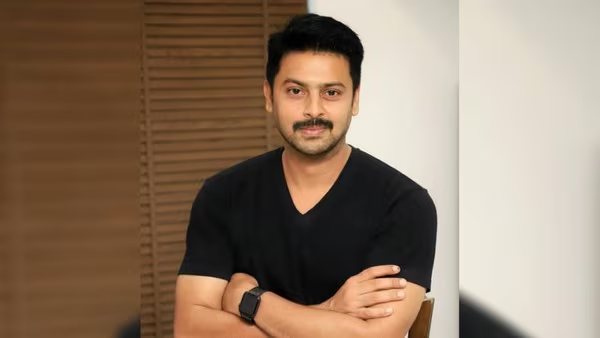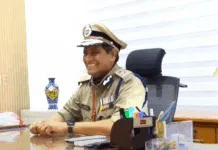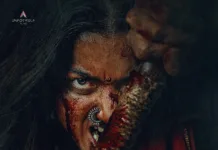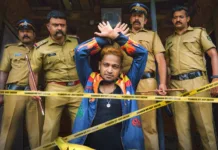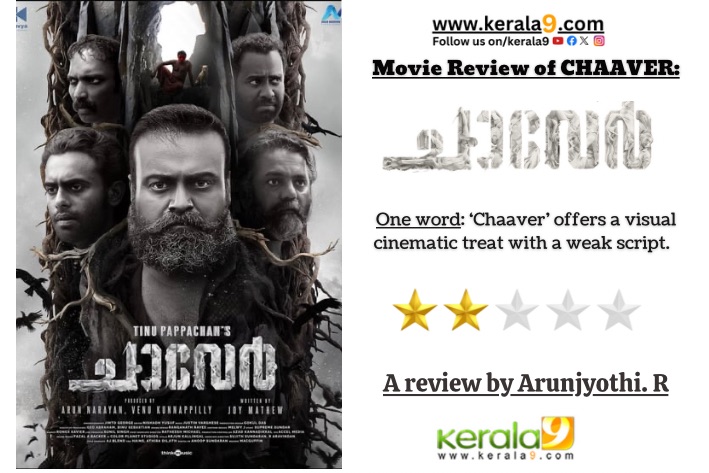
- REVIEW BY ARUNJYOTHI R
ONE WORD: ‘Chaaver’ offers a visual cinematic treat with a weak script.
•Language: MALAYALAM
•Duration: 128 Minutes
•Genre: Political Action Thriller
•POSITIVES:
1: Direction
2: Cinematography
3: Performance of Kunchacko Boban
4: Songs and Background score
6: Lighting
7: Locations
•NEGATIVES:
1: Story
2: Screenplay
3: Lagging second half
4: Duration of the film
5: Editing
7: Climax
•STORY IDEA:
The gang responsible for the murder, consisting of Ashokan, Musthafa, Asif, and Thomas, found themselves on the run shortly after the heinous act. However, Ashokan’s injury sustained during the crime required them to seek medical attention. In a twist of fate, an unsuspecting medical student named Arun, who was unaware of their criminal activities, ended up in their jeep and became entangled in their conflict. Consequently, the gang must now exert considerable effort to evade detection by the investigative team and remain off their radar.
•DETAIL REVIEW:
The film Chaaver is directed by Tinu Pappachan and written by actor Joy Mathew. The movie is produced by Arun Narayan and Venu Kunnapilly under Arun Narayanan Productions and Kavya Film Company. Jinto Geroge handled the cinematography and Nishad Yusuf did the editing for the film. With a duration of 128 minutes, the film is currently running in theatres with a U/A censor certificate.
Tinu Pappachan is a master of his craft, and his latest film Chaaver had me hooked from the moment I heard about it. With his signature style of direction and jaw-dropping camera work, I knew I had to book my tickets ASAP. Plus, the script by the talented Joy Mathew only added to my excitement. But, unfortunately, I have to admit that Chaaver fell short of my expectations. Despite the impressive making quality and stunning cinematography, I found myself bored and unengaged throughout the film. Even the usually brilliant Kunchacko Boban couldn’t save this lackluster movie. It’s a shame to say that Chaaver is the weakest film in Tinu Pappachan’s career. While I appreciate the effort put into the making of the film, it just didn’t deliver the excitement and entertainment I was hoping for.
Prepare to be disappointed. Despite the promising track record of acclaimed actor and writer Joy Mathew, his latest venture, Chaaver, falls flat on its face. Mathew, known for his hard-hitting films like Shutter, Uncle, and Saamoohyapaadam, took on the challenge of crafting the story, screenplay, and dialogues for Chaaver. With such a talented team behind it, one would expect a different cinematic experience altogether. Unfortunately, all assumptions and expectations were shattered as Mathew’s script failed to deliver the necessary components for a fully-fledged political thriller.
Chaaver’s storyline is nothing new, a tale we have seen countless times before. Set against the backdrop of Kannur politics, the film revolves around a political murder and the criminals responsible for it. The premise had potential, but the screenplay lacked the finesse needed to make the movie truly engaging. Instead, what we are left with is a tedious and unpleasant experience in the theater.
Mathew’s writing is to blame for this disappointment. He unnecessarily stretches a small plot event into a grueling 128 minutes, leaving the audience longing for something more substantial. It becomes painfully clear that the story of Chaaver simply does not fit the format of a feature film. As I watched the film unfold, I couldn’t help but feel that it was dragging on, with predictable situations and occurrences that I could easily anticipate. This predictability made my viewing experience clumsy and frustrating. In the end, Chaaver fails to live up to its potential. Despite the talent involved, the film falls short in delivering the gripping political thriller it promised. It’s a shame that Mathew’s script lacked the necessary components to make this a memorable cinematic experience. So, if you’re looking for an engaging and unpredictable film, Chaaver is not the one for you.
The film’s glaring flaw lies in its sketchily defined characters and the overtly one-sided, propagandistic political narrative that the script shamelessly pushes forward. These elements, rather than enhancing the film’s depth and complexity, only serve to hinder its overall impact and leave the audience feeling unsatisfied. The lack of character development in the writing of Joy Mathew leaves us with a shallow understanding of the individuals we are meant to invest in, making it difficult to truly connect with their struggles and triumphs. Furthermore, the heavy-handed political agenda that permeates the entire storyline feels forced and artificial. In the end, this lack of depth and unbalance in the script ultimately killed excellent making and cinematography and left us longing for a more nuanced and intellectually stimulating cinematic experience.
The second half of the film takes a daring leap, transforming from a gripping political thriller into a heart-pounding survival thriller. However, it’s unfortunate that the movie struggles to maintain its momentum and pace. The scenes leading up to the climax lack the necessary excitement and fail to keep us on the edge of our seats. Despite the stunning cinematography in the gunshot scene, it fails to deliver the anticipated thrill. The climax, which should have left us satisfied, instead leaves us wanting more. Joy Mathew cleverly hides a twist until the very end, keeping us intrigued as to why a party leader would want to kill an innocent young man who posed no threat. However, when the reason is finally revealed, it’s met with disbelief. The impact of the killings falls flat, failing to surprise or shock. It’s puzzling how Joy Mathew could come up with such a script, only to deliver a disappointing ending.
The quality of the direction and the outstanding cinematography are the only saving elements which helped to complete the movie. The hard work and passionate filmmaking of Tinu Papachan were brightly evident in the film, he tried his best to make the viewers engage but the flat script that didn’t offer anything new was literally destroying the brilliant direction of Tinu Pappachan. The cinematography by Nishadh Yusuf was also a saving factor that helped me to sit and watch. His frames and shots were entirely looking unique and different. There were many unbelievable shots and frames and it was something new to the eyes. The lighting methods used in the film were purely authentic and I was able to get a real in-depth feel of vibrancy in my eyes. The scenes which had the bloodshed had amazing lighting techniques and I felt a kind of fear that the red blood gives. The gunfire shot in the climax and the locations in the ending were a treat to watch. The climax scenes which had the fog and long trees crammed in the night vibe were fearful to watch. Theyyam scenes in the movie were magically shot and it gave a haunting feel. The background score in the film was also catchy, in the death scenes the background tunes gave a nervous feeling and I sensed a dissimilar atmosphere. The editing of Nishadh Yusuf could have been best if he had trimmed some stretchy scenes but the transition of scenes came out well and didn’t feel any sort of mismatches.
Kunchacko Boban’s performance was nothing short of electrifying, as he effortlessly brought his character Ashokan to life. From his appearance to his facial expressions, everything about him perfectly embodied the role of a political goon gang leader. But it was in the killing scene that Kunchacko truly stole the show, leaving the audience in awe of his natural acting skills.
Antony Varghese, in his extended cameo role, delivered a decent performance that didn’t quite reach the same level of intensity as Kunchacko’s. However, Arjun Ashokan’s portrayal of Arun, a character caught in the midst of a crime, was truly convincing. He flawlessly captured the innocence and vulnerability of his character, leaving a lasting impression on the viewers. Sajin Gopu and Anuroop P also deserve recognition for their notable performances as political goons. Their portrayal of these menacing characters added depth and authenticity to the film.
But it was Manoj K. U as Mustafa who truly left a lasting impact. His dialogue delivery, the way he effortlessly slipped into the slang of his Kannur language, and his overall acting prowess were simply astounding. In the climax, his sharp looks and the combination scene with Kunchacko Boban were nothing short of provocative. The fear of death was palpable in their performances, leaving the audience on the edge of their seats. Overall, the performances in this film were nothing short of captivating, with each actor bringing their own unique flair to their respective roles. It’s safe to say that the talent on display here is truly something to behold.
•CONCLUSION:
So overall the film Chaaver gave me a disappointing cinematic experience because of the pathetic script. The direction of Tinu Pappachan, the cinematography by Jinto Geroge and the performance of the actors are the only plus factors I felt about Chaaver. The movie is predictable and lagging at many points and doesn’t offer anything new other than some technical quality. The story by Joy Mathew is extremely weak and the screenplay also suffers from producing impactful scenes. So I won’t recommend the film Chaaver but if you are a fan of Tinu Pappachan movies then you can give it a try. Still, it is better to book the tickets with fewer expectations.
•VERDICT: BELOW AVERAGE
•RATING: 2/5
- A REVIEW BY ARUNJYOTHI R

